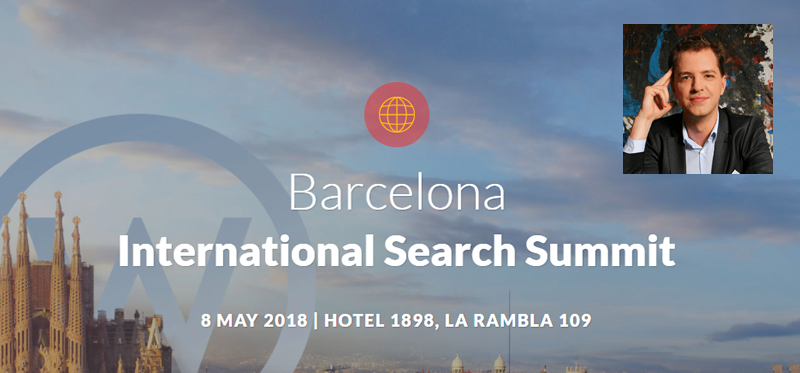The International Search Summit Barcelona is taking place on 8 May 2018. Covering a wide range of international search marketing topics and challenges, the conference is highly recommended for marketers and SEOs managing international websites and running global campaigns.
We’ve asked one of our speakers – Michiel Das from SEAT – what attendees will gain from his talk and why people should attend the International Search Summit. Here’s what he had to say!
We’re used to buzz words and ‘the next big thing’ in digital marketing – and voice search falls into that category at the moment. How important do you think it is – is it worth the hype?
You’re absolutely right that voice search is a hot topic right now, with all of the mayor players (Google, Amazon, Apple, Samsung) trying to introduce their voice assistants as quickly as possible in people’s homes, and marketing blogs and magazines constantly writing about how voice search will completely change the way we’re going to do marketing in the future. Comscore actually predicts that by 2020, one in every two searches in the USA will be done through voice assistants, so it cannot be denied that voice search is on the rise.
The speed and impact it will have in other countries (and especially in Europe) is still a point of discussion, mainly due to the following four reasons. First of all, European data protection laws are more strict than their American counterparts (e.g. GDPR regulation that will be implemented from May 2018 onwards), and it is yet to see how the European Union will react to the constant data collection of voice queries (remember: Google Home and Amazon Alexa are always listening to what you’re saying). Another thing to keep in mind is that in order to have sufficient first-mover advantage, the major players will sometimes overestimate the importance that voice search (and their specific tools) currently have (as a lot of the investigations are sponsored by them). Therefore, instead of merely looking at the number of voice assistants being sold, it would make a lot more sense to talk about the quality of those searches (and there’s currently little-to-no data available about it outside the USA). Another factor to keep in mind is that the limited number of available languages could possibly slow down their acceptance in non-English speaking countries. Finally, companies like Google still haven’t completely figured out how they can monetise voice searches (as adding ads to the spoken responses sounds very unnatural), and with 90% of their income depending on AdWords searches, it’s unlikely that they will completely stop neglecting the traditional “written” searches.
What are the biggest challenges when optimising for it? How does the approach differ from standard optimisation?
The biggest challenge for voice search optimisation is to make sure that the content on our website is considered sufficiently interesting for voice assistants to be picked up and read to users. Recent investigations suggest that having a result in the featured snippets increases the likelihood of showing up in the voice search results, and that a website’s markup plays a major role in letting search engine spiders understand what the content is about. This implies that implementing structured data (including Schema), image SEO and heading elements (H1, H2, etc.) is getting more and more important to make sure content is fully optimised.
The main difference with standard website optimisation is that instead of looking and optimising for specific keywords (and related search volumes) we are now shifting towards natural language queries and long-tail phrases. Although it might sound complicated to integrate these long-tail searches within our website, in my talk I’m going to show a case study about how to optimise for voice search using a frequently asked questions (FAQs) section.
From an international perspective, how much is the strategy differing between markets? Is the uptake and usage of voice search significantly different between countries?
At the moment voice search is particularly on the rise in English speaking countries (mainly UK and Ireland in Europe), largely due to the language barrier I mentioned earlier. We’ve recently also seen an increase in visits from long-tail keywords in Germany and France, but in most other European countries voice search still isn’t a reality. Though voice search still hasn’t completely caught on in these other countries, our tests indicate that optimising for it will eventually also have a positive effect on “normal” SEO traffic results .
What will ISS attendees learn from your talk?
During my talk we’ll have a look at why voice search is considered the “next big thing” in marketing and who the most dominant players are. We’ll also have a closer look at the problems that voice search faces and the solutions that are currently at hand. In the last part of the talk, I’ll share a list of helpful tips and tricks that marketers can implement right now to increase the likelihood of being featured in the voice search results, and some studies and conclusions of tests that we’ve conducted so far (together with international best cases).
And why attend the International Search Summit?
Join the International Search Summit if you want to learn more about the latest evolutions in digital marketing, get practical insights and tips to optimise your website for search engines, and get to know other marketers from around the world. Attending Barcelona’s International Search Summit is the perfect combination of having fun while networking with other search engine enthusiasts and learning how to dominate search engines. I’ll see you there!
Michiel Das is a digital marketing specialist, entrepreneur and Associate Professor living and working in Barcelona, Spain. As SEAT’s Global SEO & SEM Manager, he’s in charge of bringing SEAT’s digital presence to new heights and ensuring website visits and conversions rates keep improving.
As well as Michiel’s session on voice search, other speakers and topics at this year’s International Search Summit Barcelona will include: Eoghan Henn talking about global domain strategies, Bill Hunt who will talk about missed opportunities in international search and Jeroen Maljers who will discuss B2B PPC campaigns. The event will also feature a Q&A session with Gary Illyes from Google.
Feeling tempted? You can still buy tickets for International Search Summit Barcelona here! Early bird rates end 22 April 2018.








